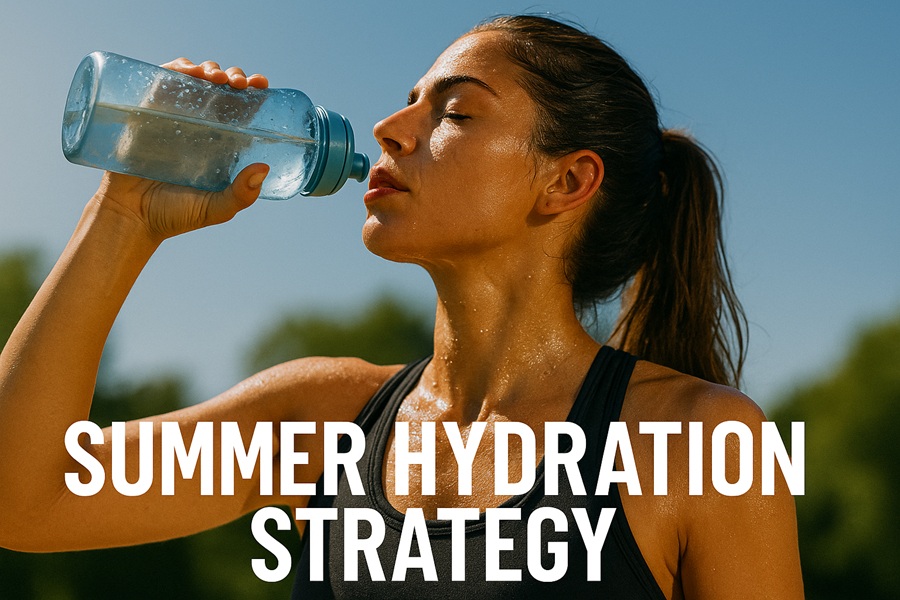Summer Hydration Strategy: How Much Water Do You Really Need During Hot Weather Workouts?

Let's have a real talk. You’re putting in the effort, sweating it out under the summer sun, but you feel like you’re moving through mud. Your energy crashes halfway through your workout, you get a splitting headache later, and maybe you even feel a little dizzy. You think you just need to push harder, right? Wrong.
What if I told you the problem probably isn't your effort, but your water bottle? Proper summer hydration is the most overlooked secret to unlocking better performance and actually feeling good during hot weather exercise. I learned this the hard way, of course. Years ago, I went on a long run on a blistering day with a tiny bottle of water, thinking I was tough. An hour in, I was dizzy, weak, and my pace dropped to a crawl. The post-run headache felt like someone was using my skull for drum practice. It was a miserable, rookie mistake I'll never forget.
Why Your Body is a Dehydration Factory in the Summer
Think of your body as an engine. When you work out, that engine gets hot. Sweat is your radiator fluid — it evaporates off your skin and cools you down. It’s a brilliant system, but you’re constantly losing fluid. In the heat and humidity, you're losing it at an alarming rate.
Even a tiny drop in hydration — just 2% of your body weight — can wreck your performance. We're talking about:
- Reduced endurance
- Decreased strength
- Slower reaction time
- Increased risk of muscle cramps
- Your brain feeling foggy
Ignoring your workout hydration isn't just about having a bad session; it's about safety. It’s a fast track to heat exhaustion or worse. If you want to train effectively, you have to respect the heat, and that starts with respecting your water needs. For more on this, I've written about training safely in the summer heat before.
The "Before, During, and After" Hydration Blueprint
So how much do you actually need? Forget the generic "8 glasses a day." Your water intake exercise needs are way more specific, especially in summer. Here’s a simple, no-nonsense plan.
1. Pre-Hydrate (The Warm-Up)
Don't start your workout already in a deficit. You can't play catch-up.
- 2-3 hours before your workout: Drink about 500-600 ml (or 17-20 oz) of water. That's basically a standard water bottle.
- Right before you start: Top off the tank with another 200-300 ml (7-10 oz) about 20 minutes before you begin.
2. Hydrate During (The Main Event)
The goal here is to drink at a rate that roughly matches your sweat rate. For most people, that means:
- Every 15-20 minutes: Take 4-6 big gulps of water, which is about 200-300 ml (7-10 oz).
Yeah, it feels like a lot. And yes, you might have to carry a bigger bottle or plan a route with a water fountain. Do it. It’s a non-negotiable part of the workout itself.
3. Rehydrate After (The Cool-Down)
You finished. You're dripping sweat. You’re not done yet. Recovery starts now.
- Within 30 minutes: Start sipping water steadily.
- The Pro-Tip (if you're nerdy like me): Weigh yourself before and after a workout. For every 1 pound (or ~0.5 kg) of body weight you lost, you need to drink about 500-700 ml (16-24 oz) of fluid to get back to baseline. It’s a real eye-opener to see how much you actually lose.
If that's too much hassle, just make a conscious effort to keep drinking water for the next few hours. Your body will thank you.
Water Isn't Always Enough: The Real Deal on Electrolytes
Okay, here’s where it gets a little more complex. If your workout is long (over 60-90 minutes) or you’re a particularly heavy, salty sweater (do you get white streaks on your clothes?), water alone might not cut it. You need to replace electrolytes summer workouts drain from you.
What are electrolytes? Think of them as the tiny electrical sparks that keep your muscles contracting and your nerves firing properly. The main ones you lose in sweat are sodium and potassium. When they get low, you get cramps, fatigue, and that "blah" feeling.
So, when do you need a sports drink or an electrolyte tablet?
- Workouts under an hour: Plain water is probably fine.
- Intense workouts over an hour: This is where electrolytes become your best friend.
- Extreme heat and humidity: Even on shorter workouts, if you're sweating buckets, you'll benefit from electrolytes.
You don't need to chug a sugary neon drink from the gas station. Look for low-sugar electrolyte tabs or powders. Or, hell, make your own: a big bottle of water with a pinch of sea salt and a splash of orange juice works wonders. Proper nutrition is key to performance, and that includes your drink. If you want to go really in-depth, you can dive deeper into sports nutrition on the blog.
Are You Dehydrated? The Foolproof Way to Tell
Don’t wait until you're thirsty. Thirst is a lagging indicator; by the time you feel it, you’re already dehydrated.
The easiest, most honest feedback your body can give you? Check your pee.
- Pale yellow or clear like lemonade: You're golden. Keep it up.
- Bright or dark yellow, like apple juice: Red flag. You need to drink more, right now.
Other signs include: a dry mouth, feeling tired or sluggish, headache, and dizziness. Listen to these signs. They’re not signs of weakness; they’re your body’s dashboard warning lights.
Look, I get it. Remembering to drink this much water can feel like a part-time job. But it's the simplest, cheapest, and most effective thing you can do to make your summer workouts better and safer. So grab your bottle, make a plan, and go smash that workout. You’ve got this.